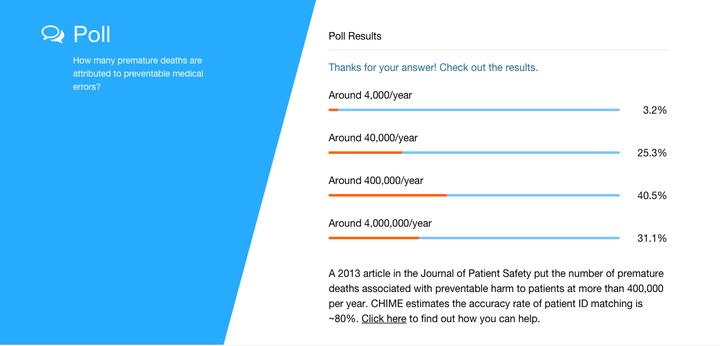
In a recent poll of our platform visitors, we asked, "How many deaths are attributed to preventable medical errors?"
190 visitors to our platform participated and the largest portion of respondants (40.5%) chose the most accurate statistic. A 2013 study published in the Journal of Patient Safety estimates the number of premature deaths associated with preventable harm to patients at somewhere between 210,000 to 448,000 per year.
Statistically, it is the third leading cause of death in the United States. However, it is rarely ever reported. Do a search for "leading causes of death" and you'll be very hard pressed to find Preventable Medical Errors sandwiched between Cancer and Chronic Lower Respiratory Diseases. And that is really what makes the problem of PMEs so acute - a lack of awareness, ergo a lack of solution. This is not isolated to the United States - both Canada and the UK have identified this problem. It's a perfect area in which to launch an inventive prize challenge.
One of the numerous causes of PMEs is the mismatching of patient with their medical records. When you seek medical attention, your medical records inform doctors and nurses on every decision they make in treating your malady.
CHIME is an organization of over 1400 IT professionals from hospitals across the U.S. They are the people who are responsible for building and maintaining the systems that store and deliver your medical records. And because there is no universal system for doing so, CHIME has estimated the accuracy in patient-record matching to be around 80%. That missing 20% is causing millions and millions of dollars in costs, it is slowing down the treatment process, and it is destroying a lot of lives.
Keyword: PREVENTABLE
CHIME's National Patient ID Challenge is an incentive prize to develop a universal system for patient-record matching that can achieve 100% accuracy. Visit their challenge page. Add your voice to that conversation in their Comments thread. Share it on your social media feeds. If you know any medical professionals, refer them to the challenge so that they can share their expertise and help to solve this problem.
The next time you see a doctor or nurse, tell them about the National Patient ID Challenge. Though you might never realize it, you may be causing the circumstances for the solution to be found. You may be saving a few hundred thousand people's lives. Put that on your resume.








